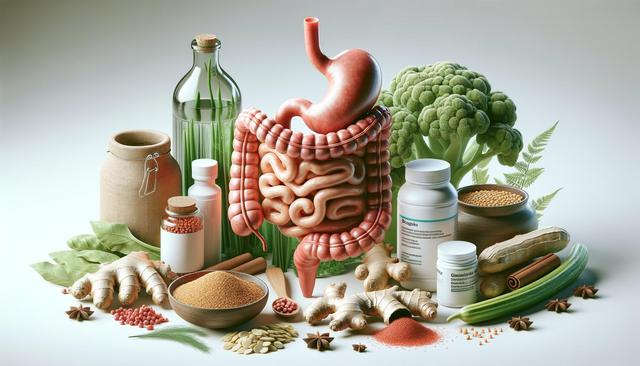Understanding Bloated Stomach: Causes and How to Manage It
A bloated stomach can be uncomfortable and frustrating, but understanding its causes can help you find relief.

What Is a Bloated Stomach?
A bloated stomach refers to a feeling of fullness, tightness, or swelling in the abdomen. Many people experience this sensation occasionally, especially after eating a large meal or certain types of food. Though commonly associated with digestive issues, bloating can also be triggered by various other factors. It’s important to differentiate between temporary bloating and chronic bloating, as the latter may signal an underlying health issue that needs medical attention. The sensation can range from mildly annoying to significantly uncomfortable, often accompanied by visible abdominal distention.
Common symptoms of bloating include:
- A swollen or distended abdomen
- Excessive gas or flatulence
- Abdominal pain or cramps
- Frequent burping
- A feeling of heaviness or pressure
Understanding what’s normal and what’s not can help in identifying patterns and seeking appropriate care when bloating becomes persistent or painful.
Common Causes of Bloating
There are numerous reasons why someone might experience a bloated stomach. The most frequent causes are related to diet and digestion, but hormonal and lifestyle factors can also play a role. Here are some of the main culprits:
- Overeating: Consuming large meals can stretch the stomach and cause discomfort.
- Gas-producing foods: Beans, lentils, broccoli, cabbage, and carbonated drinks often lead to excess gas.
- Swallowing air: Eating too quickly, chewing gum, or drinking through a straw can introduce air into the digestive tract.
- Food intolerances: Lactose intolerance and gluten sensitivity can lead to bloating and other gastrointestinal symptoms.
- Constipation: When stool builds up in the colon, it can lead to bloating and discomfort.
Other potential causes include hormonal changes (such as those during menstruation), certain medications, and stress, which can alter digestion and lead to bloating. Identifying the specific cause is crucial for effective management.
Digestive Disorders Linked to Bloating
In some cases, bloating may be a symptom of a more serious digestive condition. These conditions often require medical diagnosis and treatment. Some of the most common digestive disorders associated with bloating include:
- Irritable Bowel Syndrome (IBS): Characterized by abdominal pain, gas, and irregular bowel movements.
- Small Intestinal Bacterial Overgrowth (SIBO): An overgrowth of bacteria in the small intestine that causes gas and bloating.
- Gastroparesis: A condition where the stomach empties too slowly, leading to fullness and bloating.
- Celiac Disease: An autoimmune reaction to gluten that damages the small intestine and causes bloating, among other symptoms.
For individuals experiencing ongoing bloating not relieved by lifestyle changes, consulting a healthcare provider is essential. Diagnostic tests may be necessary to rule out or confirm these conditions.
Effective Treatments and Remedies
Treating a bloated stomach depends largely on the underlying cause. For many people, simple lifestyle and dietary changes can provide significant relief. Here are some practical tips to help manage bloating:
- Eat slowly and chew thoroughly to reduce swallowed air.
- Avoid carbonated drinks and chewing gum.
- Identify and eliminate trigger foods, such as dairy or gluten, if intolerances are suspected.
- Incorporate fiber gradually to prevent constipation without causing gas.
- Stay hydrated to aid digestion and regular bowel movements.
Over-the-counter remedies, such as simethicone for gas or digestive enzymes, may also be helpful. In some cases, probiotics can improve gut flora and reduce bloating. It’s important to use these products under medical guidance, especially if symptoms persist.
When to See a Doctor
While occasional bloating is normal, persistent or severe bloating should not be ignored. If bloating is accompanied by other symptoms such as weight loss, severe pain, vomiting, or changes in bowel habits, it is important to seek medical care. These could be signs of more serious conditions that require targeted treatment.
A healthcare provider may recommend:
- Blood tests to check for infections or celiac disease
- Allergy or intolerance testing
- Ultrasound or CT scan to look for structural issues
- Endoscopy or colonoscopy for a closer examination of the digestive tract
Early diagnosis and treatment can prevent complications and improve quality of life, especially when bloating is a symptom of an underlying medical issue.
Conclusion: Managing Bloating for Better Digestive Health
Bloating is a common yet manageable condition that can often be improved with simple lifestyle adjustments. By paying attention to eating habits, identifying food sensitivities, and seeking medical advice when necessary, most people can significantly reduce the discomfort of a bloated stomach. For those experiencing frequent or severe bloating, professional guidance is key to uncovering underlying causes and finding effective, personalized treatment options. Staying informed and proactive is the first step toward better digestive health and overall well-being.